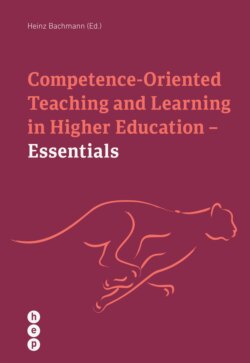Читать книгу Competence Oriented Teaching and Learning in Higher Education - Essentials (E-Book) - Heinz Bachmann - Страница 4
На сайте Литреса книга снята с продажи.
ОглавлениеPreface
To collect the essentials of teaching in higher education in a short book for busy novice faculty is a challenging if not impossible task. There are no easy recipes for coping with the complexity of processes of teaching and learning. Still, we believe it is worth trying to point out the essential considerations that faculty in any subject and in any higher education context should keep in mind when they engage in teaching. If faculty manage to shift their focus away from their own “performance on stage” as a teacher to the effect their teaching has on the learning of individual students, they are on track.
For over 10 years at the Centre for Teaching and Learning in Higher Education at Zurich University of Teacher Education we have supported faculty coming from a wide variety of disciplines, mainly from Swiss universities of applied sciences, in reflecting and further developing their teaching. Although they keep telling us how unique their teaching context is, and while we are aware of the benefits of a discipline-specific approach to faculty development, we remain convinced that some of the issues affecting beginning faculty are surprisingly similar.
Various parts of the book address three essential competences necessary to further academics’ teaching approaches: the planning of a course or degree programme, the practice of active learning methods and the use of formative assessment, from a theoretical but also practical point of view. With this book, we also are looking forward to sharing and discussing experiences with colleagues teaching in other countries (e.g. in the context of various international collaborations).
Ultimately, we would like to support individual faculty in understanding their teaching as research; this means, investigating their teaching by starting to formulate hypotheses and possible questions about the effects of their respective interventions. Only with an evidence-based approach, focused on what works with an individual group of students, can faculty slowly but steadily develop effective approaches to teaching that match students’ needs in a particular context. In this sense, we encourage readers to make a proof of concept of what is discussed in this book in their daily teaching practice and further develop their own strategies. With best wishes for rewarding and effective learning processes for both you and your students.
Franziska Zellweger
Head of the Centre for Teaching and Learning at Zurich University of Teacher Education
